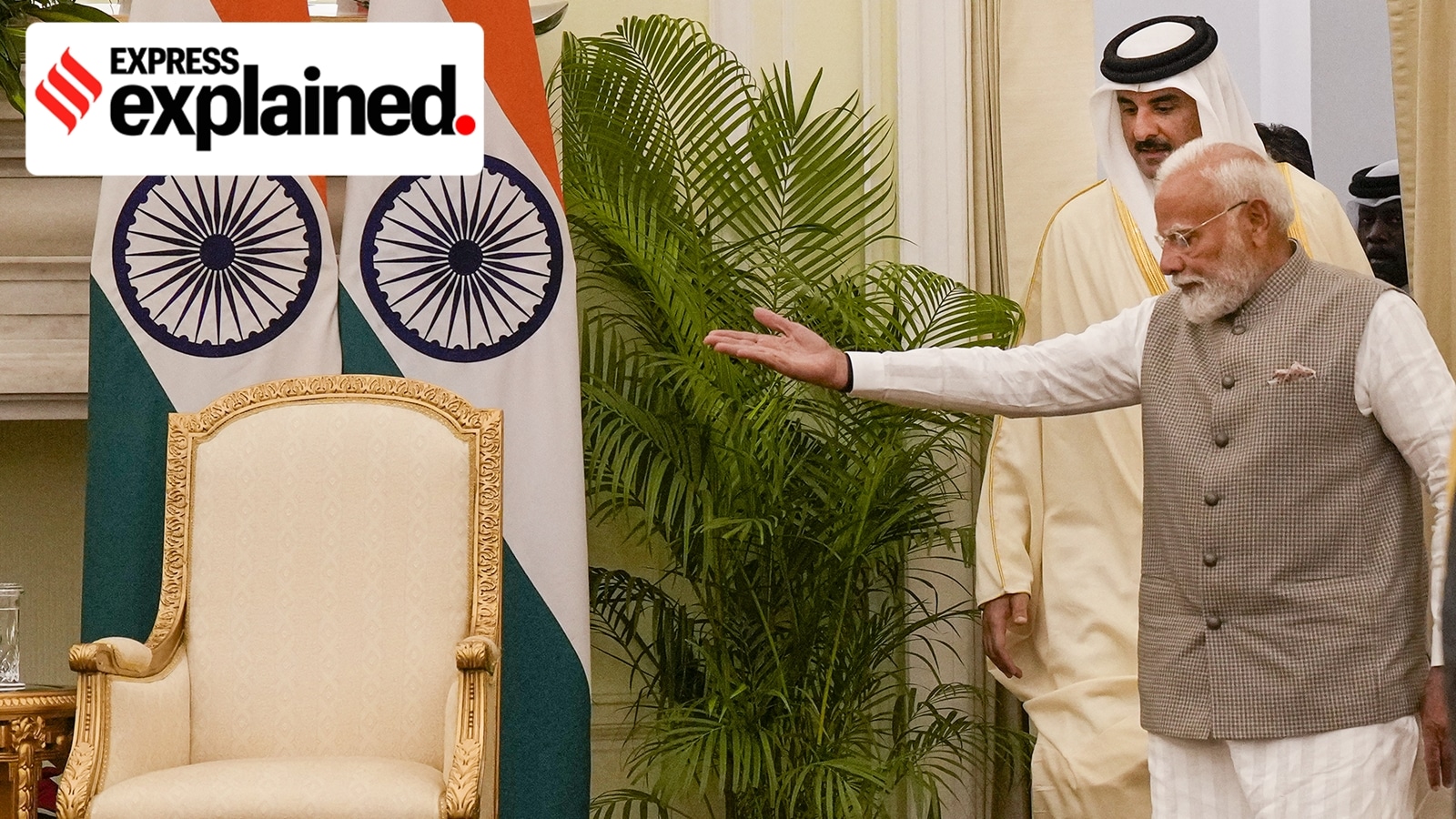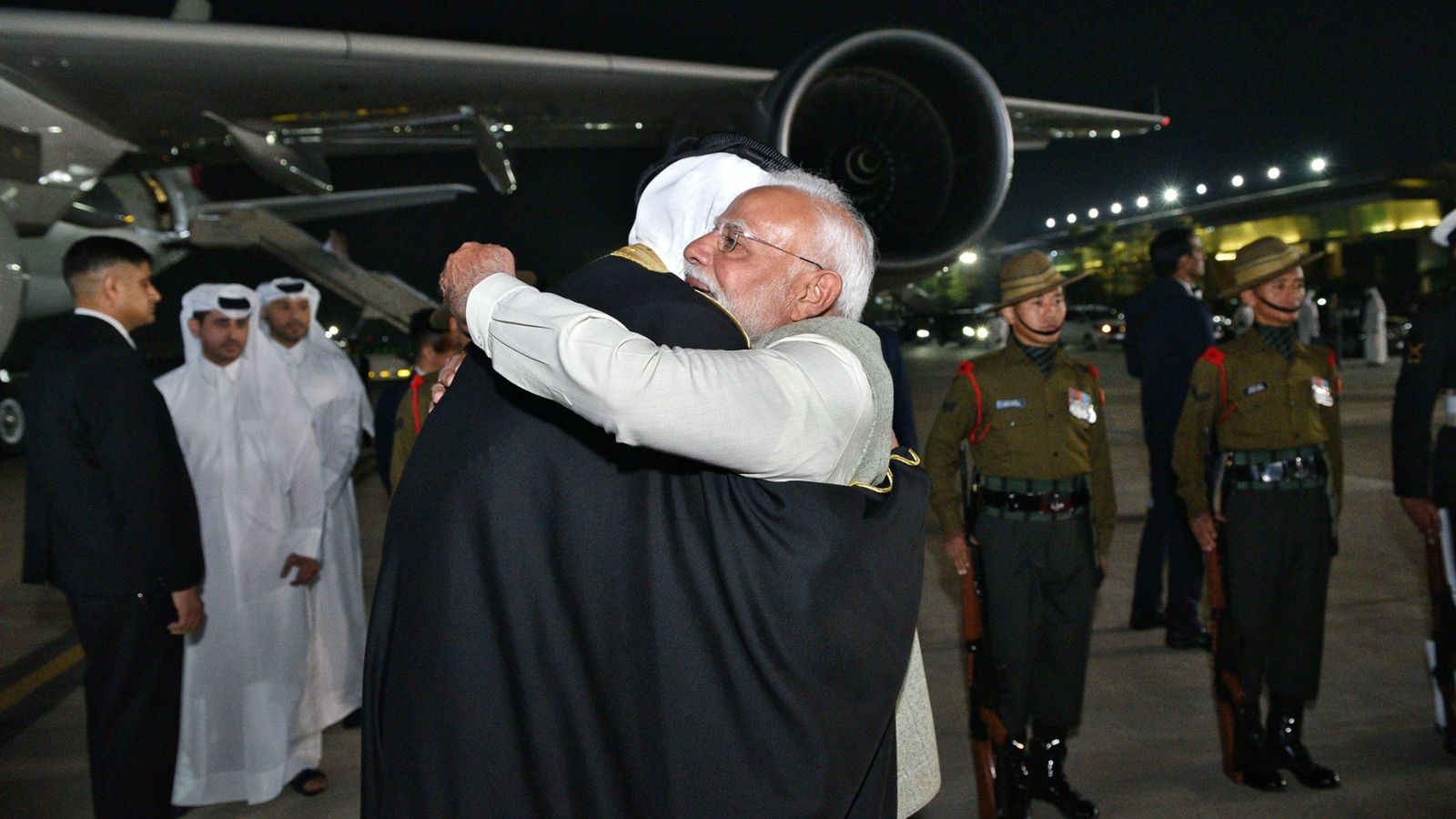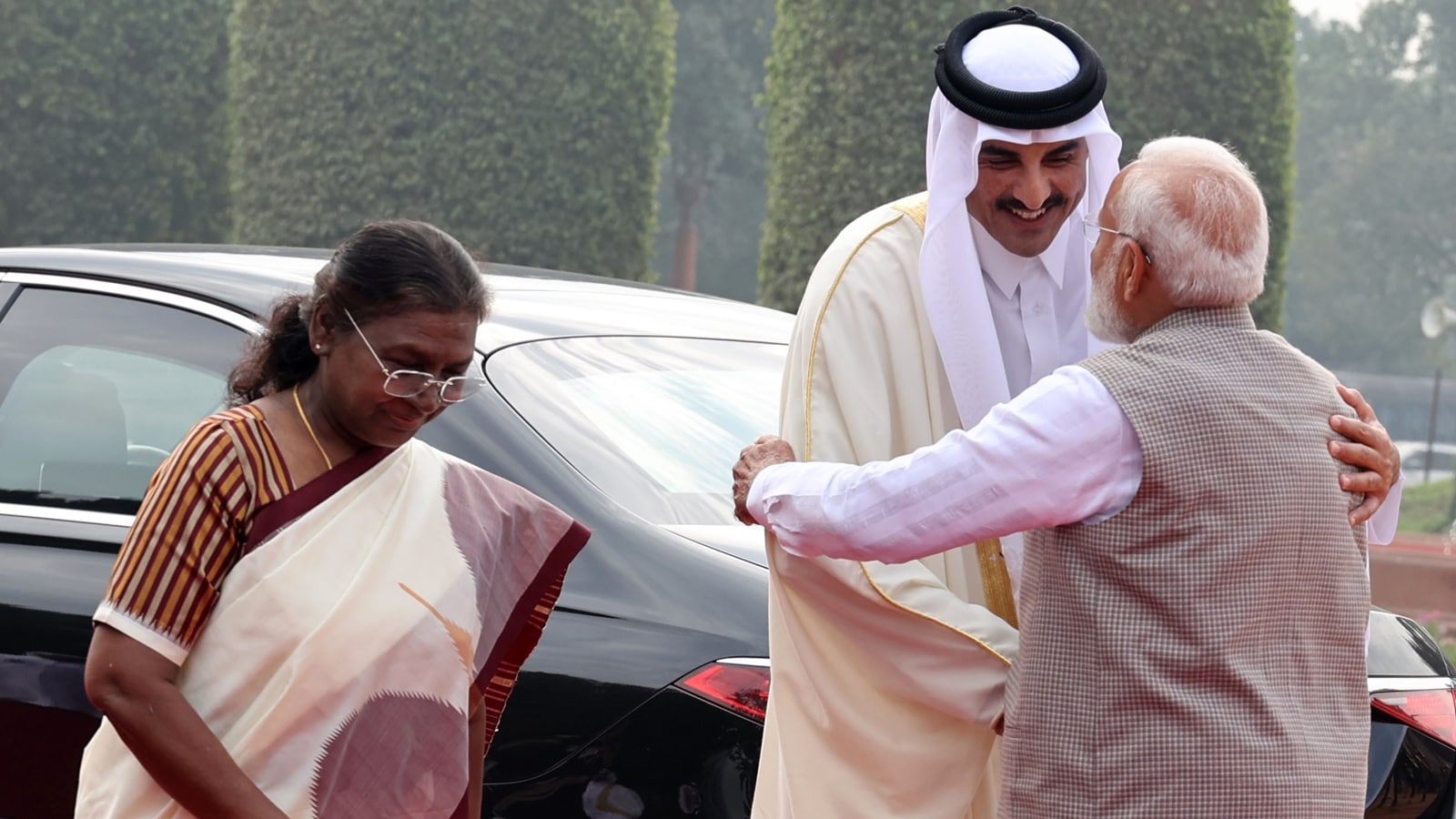Sheikh Al Thani visits India: New Delhi’s Qatar opportunity, in trade and geopolitics
Qatar is a uniquely important player in the Middle East. Raising the India-Qatar relationship to a Strategic Partnership indicates the healthy status of bilateral ties and signals their further elevation. An expert explains its significance.
 Prime Minister Narendra Modi and the Amir of Qatar Sheikh Tamim bin Hamad Al Thani at the Hyderabad House in New Delhi on Tuesday. (PTI)
Prime Minister Narendra Modi and the Amir of Qatar Sheikh Tamim bin Hamad Al Thani at the Hyderabad House in New Delhi on Tuesday. (PTI)The February 17-18 State Visit of the Amir of Qatar to India coincided with a meeting of the India-Qatar Joint Business Forum featuring the Ministers of Commerce of both countries and senior stakeholders in the fields of Qatari finance, energy, infrastructure, and technology.
The visit by Sheikh Tamim bin Hamad Al Thani was expected after External Affairs Minister S Jaishankar travelled to Doha in late June and early December 2024, and then again over the New Year period.
Not only is the trade relationship with Qatar — dominated by imports of liquified natural gas (LNG) — critical to India, the emirate occupies a pivotal position in the geopolitics of the Middle East, where both the future of Gaza and the broader stability of the region are at stake.
How have bilateral ties fared since the Amir last visited India in March 2015?
The 2015 visit of Sheikh Tamim bin Hamad Al Thani had yielded an elaborate joint statement that reflected cooperation across sectors, and India’s desire to help the objectives of Qatar’s Vision 2030.
In the 10 years since then, as India and Qatar have worked to elevate bilateral ties, they have repeatedly negotiated challenges to the relationship arising out of either bilateral or regional (Gulf) tensions.
INDIA & QATAR: Twice, in 2015 and 2016, Prime Minister Narendra Modi’s personal outreach and reciprocal State Visits focused on diasporic issues. The abuse faced by Indian labour in Qatar, and the need for assurances of labour law reform, featured prominently in the PM’s discussions with the Amir.
At the time, rough edges appeared in the relationship due to a $1 billion penalty that India’s PetroNet faced for a breach of contract with Qatar’s RasGas. Focused diplomacy, however, led to Doha both waiving the penalty and slashing gas prices by almost 50% for India.
 Prime Minister Modi greets Amir of Qatar Sheikh Tamim Bin Hamad Al-Thani at New Delhi airport. (Source: X/@MEAIndia)
Prime Minister Modi greets Amir of Qatar Sheikh Tamim Bin Hamad Al-Thani at New Delhi airport. (Source: X/@MEAIndia)
The PM’s meeting with the Amir on December 1, 2023 on the sidelines of the COP28 climate summit in Dubai led to Qatar mitigating the death sentences passed on Indian Navy veterans imprisoned on charges of espionage in the emirate.
All but one of the eight veterans taken into custody in August 2022 were released in February 2024, just ahead of the Prime Minister’s State Visit to Doha.
The broad focus on crisis resolution was reflected in the Ministry of External Affairs’ short release on Jaishankar’s visit to Doha on June 30, underlining the commitment by the two sides to a “review” of “various aspects of bilateral relations”.
QATAR & THE REGION: The Qatar-Arab League diplomatic crisis led to an air, land, and sea blockade of Qatar by Saudi Arabia, UAE, Egypt, and Bahrain from 2017 to 2021.
The crisis had a severe disabling impact on India’s effort to elevate its relationship with Qatar, where more than 800,000 Indian expatriates work. Qatar was supplying half of India’s LNG imports at the time, and former Indian Ambassadors to Doha such as K P Fabian strongly criticised the Gulf Cooperation Council (GCC) for the “major diplomatic error”.
India’s official reaction was more muted, calling for “constructive dialogue and peaceful resolution”.
 President Droupadi Murmu, Prime Minister Narendra Modi receive Amir of Qatar, Sheikh Tamim bin Hamad Al Thani, at the Rashtrapati Bhavan, Tuesday. (Express photo by Renuka Puri)
President Droupadi Murmu, Prime Minister Narendra Modi receive Amir of Qatar, Sheikh Tamim bin Hamad Al Thani, at the Rashtrapati Bhavan, Tuesday. (Express photo by Renuka Puri)
How has Qatar handled its relationships with neighbours in the region?
A major trigger ostensibly for the 2017-21 Saudi-led blockade was Doha’s ties with Islamist organisations such as the Muslim Brotherhood and its offshoots, including major terrorist groups in the Middle East.
But Qatar turned the crisis into an opportunity, and leveraged it to host diplomatic interactions between the states and these groups once the major actors shifted their positions.
A premier example was of the Taliban setting up an office in Doha, which allowed the United States to conclude its 2020 agreement with the group that would take power in Kabul a year and a half later. It also allowed India’s first official outreach to the Taliban when India’s Ambassador to Qatar, Deepak Mittal, met Sher Abbas Stanikzai, head of the Taliban’s Doha Political Office, in August 2021.
More recently, Qatar, which has had long-standing ties with the leadership of Hamas, played a crucial mediating role, alongside Egypt, for 15 months of the war in Gaza, culminating in the ceasefire of January 2025.
The agreement, which has held so far, has made Qatar a diplomatic heavyweight, out of the shadow of the UAE and Saudi Arabia.
The fall of Bashar al-Assad in Syria too, has put Qatar in a geopolitically opportune space.
Doha, along with Ankara, had been a significant backer — politically, financially, and diplomatically — of anti-Assad forces in Syria’s civil war, even as other Gulf Arab states re-embraced Assad and brought Syria back into the Arab fold in 2023.
After Assad’s fall, Qatar has emerged as the most prominent financier for Syria’s transition administration.
As Qatar’s vital trade routes to its Gulf neighbours were cut off during the blockade years, Doha invested in easier access to extra-regional partners such as India. Two direct shipping lines to the Mundra and Nhava Sheva ports began in 2017.
Over the next three years, Qatar liberalised its socio-economic structure to extend the right to free education and healthcare to non-citizens. In 2018, it offered permanent residency in particular areas to select groups of expatriates, including Indians. This, along with the removal of visa restrictions for more than 80 countries (including India), boosted international travel to Qatar amidst the Gulf blockade, Middle East expert Kristian Coates Ulrichsen noted in Qatar and the Gulf Crisis (2020).
Doha opened up to the world even as it remained closed to the Gulf. So, when the Gulf moved towards unprecedented rapprochement across geopolitical lines (Arab-Israel, Arab-Iran, Gulf-Qatar), Doha had much to gain.
What is different about the India-Qatar relationship now?
As the region saw these shifts, India found itself having to manage its relationship with Qatar. While it proactively deepened ties with other GCC states, India’s relationship with Qatar focused on safeguarding core interests, even if enough stakes existed in the bilateral.
For example, when India and its Gulf partners unveiled the India-Middle East Economic Corridor (IMEEC) in September 2023, it bypassed Qatar — something that Qatari experts subtly criticised.
Now, with bilateral issues all but settled, there is scope for a real opening-up in the India-Qatar relationship.
India is Qatar’s second largest trading partner, with bilateral trade of about $14 billion in 2024. As the exiting Biden administration imposed new sanctions on Russian oil (the future of which lies in the hands of the Trump administration), state-owned QatarEnergy secured a five-year agreement to supply India’s GAIL with 12 LNG cargoes per year. QatarEnergy and India’s Petronet earlier signed a mega 20-year LNG deal worth $78 billion, which allowed India to save at least $6 billion, notwithstanding shifts in global oil prices.
During the Amir’s visit, India and Qatar decided to elevate their relationship to a Strategic Partnership. The word ‘strategic’ is widely used as a descriptor during India-UAE or India-Saudi Arabia interactions, but has rarely found mention in high-level India-Qatar diplomatic exchanges in the past. The joint statement went beyond diasporic issues and committed Qatar to a $10 billion investment in India. The two sides are looking to double trade to $28 billion over the next five years.
Asked what the “strategic partnership” implied, the MEA said India seeks to deepen “cooperation [with Qatar] in… trade, energy, investment, security, as well as in the regional and international fora”.
With a new Bilateral Investment Treaty (BIT) in the works, India will likely be more comfortable with modifications to the existing 2015 model to accommodate potential Qatari needs. This flexibility was observed in India’s BIT with the UAE in 2024.
There is also a significant expansion in institutional avenues for greater business-community interactions, most recently through MoUs signed between the Qatari Businessmen Association and Confederation of Indian Industry, and between Invest Qatar and Invest India. The more trade and business expand, the larger is the constituency that can guardrail the relationship in the event of a future crisis, whether bilateral or regional.
Bashir Ali Abbas is a Senior Research Associate at the Council for Strategic and Defense Research, New Delhi
- 01
- 02
- 03
- 04
- 05






































